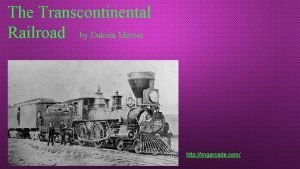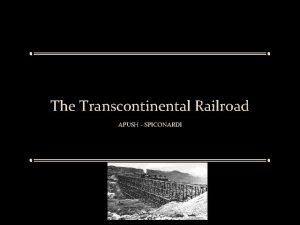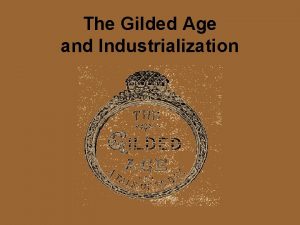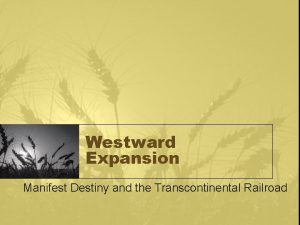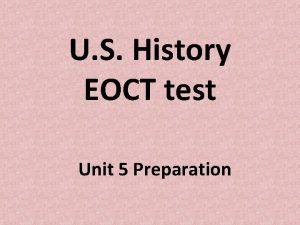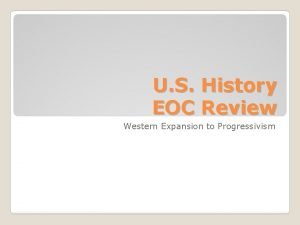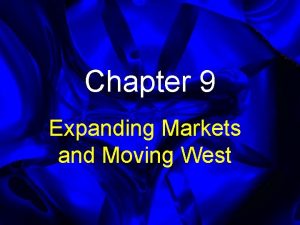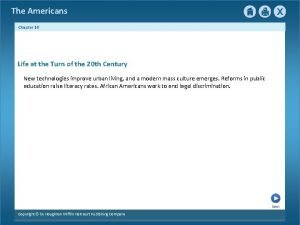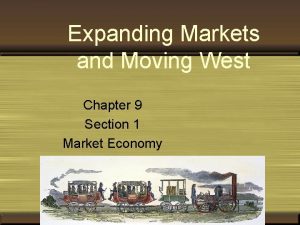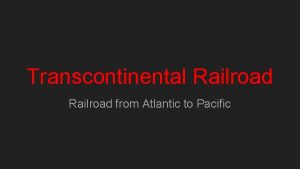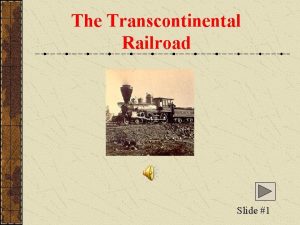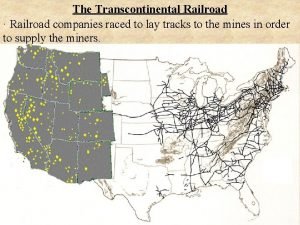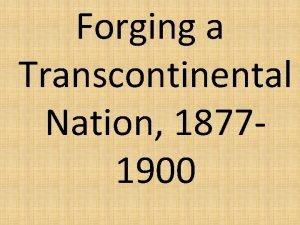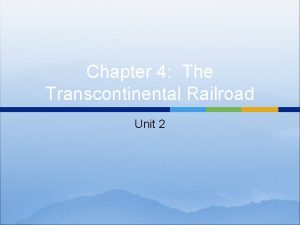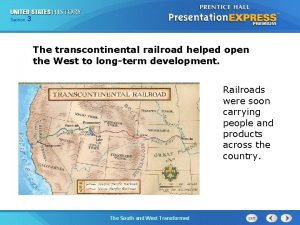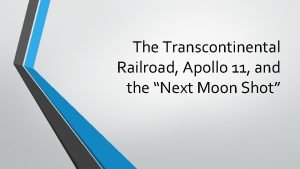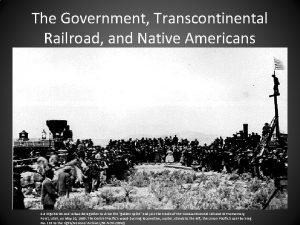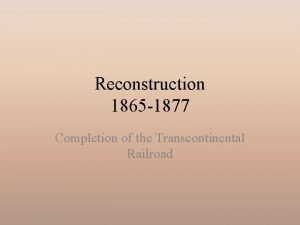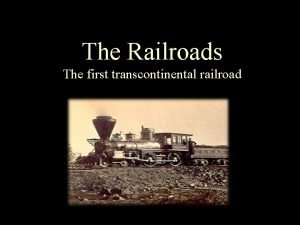Chapter 7 NEW FRONTIERS Expanding Frontiers Transcontinental Railroad















- Slides: 15

Chapter 7 NEW FRONTIERS

Expanding Frontiers Transcontinental Railroad- connects east and west Homestead Act of 1862 - 160 acres free Cattle Frontier- cattle grazed, driven to RR centers and shipped back east “Cattle Kingdom” - $6 to $60 Cowhands- work hard 1, 000 miles in 3 months--$40 to $50 a month Cowtowns- drinking, gambling, fighting

Mountains and Valleys Timberlands of CA and Northwest Large companies did the mining for metals Gold, silver, lead, copper, tin, and zinc Farmers reap the benefits by selling produce to the miners Spanish heritage of farming and ranching

Railroad Pacific RR Act 1862 - Union Pacific start in Omaha, Central Pacific from Sacramento Government gave land grants- 20 sq. miles per mile of track, RR barons made fortunes on the land Workers from all nationalities helped RR met in Promontory, Utah By the end of 1800 s, 4 more trans-cont.

Industrialism U. S. becomes an industrial giant after Civil War— manufacturing replaced agriculture Now heavy-industry consumer goods Iron ore—steel and Coal—fuel Technology Boom—Thomas Edison invented light bulbreplaced candles and oil lamps Patents go up dramatically 1860 -1900 A. Graham Bell-telephone 1900 - 1. 3 million New technology and products -manufacturing, business & consumerism

National Markets RR are year round and efficient Refrigerated RR cars Gustavus Swift- meat sold more cheaply National meatpacking plants Fruits and Vegetables from West Coast Nationwide Business—consumer businesses and goods, nationwide chain stores—products moved by rail (cheap) Consumerism- department stores catered to consumers and advertising increased a lot

The Growth of Big Business Heavy industry and nationwide markets brought a change in business organization Managerial Revolution One person cannot oversee all employees Separate functions of business into departments. For example, in RR, tracks, cargo, traffic, and maintenance

Merger Movement Businesses did well until depression hit in 1870 s, then they had to cut back– unemployment and bankruptcy Solution—merge or combine several competing firms John D. Rockefeller built up his Standard Oil business by buying a lot of competing firms By 1870 -80 s, Standard Oil owned 90% of the nation’s pipelines and refined 84% of the nation’s oil.

Horizontal and Vertical Integration Horizontal integration joined competing businesses in one area of the market. Vertical joined all areas of one business Andrew Carnegie-used vertical integration with his steel

Social Darwinism Based on Charles Darwin’s natural selection in which fittest survive Herbert Spencer-Social Darwinism explains human society Said government interference with the separation of the weak from the strong would only hold back progress. Carnegie gave money to the poor and supported arts, education, and culture, established foundations

Populist Platform Populist Party was a 3 rd Party that came about in the late 1800 The Populists denounced societal ills Populists represented farmers, laborers, and reformers and wanted to put government back in the hands of the people Ideas: restrict immigration, shorter workday, coinage of silver (cause inflation and raise prices for farm goods)

Problems Faced by Farmers Problem: Farmers produced too much Huge farms & better farming methods meant they produced more than world demanded=lower prices High transportation costs Kept borrowing money to cultivate more land Some couldn’t repay loans and banks foreclosed on land Nature’s wrath: plague of grasshoppers, droughts, loneliness “In God we trusted, in Kansas we busted. ”

Farmers Unite Wanted strength in numbers—formed Patrons of Husbandry (Grange) 1867 -1875 had over 1 million members Wanted government to regulate freight rates Fund agricultural colleges (K-State) Formed cooperatives or co-ops Farmer’s Alliances Pooled resourced together to save money Bought bulk quantities of supplies and machinery

Populism Results Populist candidate for President lost to Grover Cleveland in 1892 Gained 14 seats in Congress Won 2 Governorships Won largest number of popular votes by any third party in the 1800 s

Why Populism Failed They failed to gain wide support in the South The issue of White Supremacy was the underlying issue Fear: Populism might lead to gains by African Americans—Southerners didn’t like this
 Ducksters transcontinental railroad
Ducksters transcontinental railroad Transcontinental railroad apush
Transcontinental railroad apush Transcontinental railroad
Transcontinental railroad Manifest destiny railroads
Manifest destiny railroads Who helped build the transcontinental railroad
Who helped build the transcontinental railroad Us cavalry general whose unwise and reckless
Us cavalry general whose unwise and reckless Famous people of the industrial revolution
Famous people of the industrial revolution Alister stevens
Alister stevens Unix internals
Unix internals Boeing research and technology
Boeing research and technology Chapter 9 frontiers of biotechnology
Chapter 9 frontiers of biotechnology Frontiers of biotechnology chapter 9
Frontiers of biotechnology chapter 9 Chapter 9 frontiers of biotechnology
Chapter 9 frontiers of biotechnology Chapter 9 expanding markets and moving west
Chapter 9 expanding markets and moving west Chapter 16 section 2 expanding public education
Chapter 16 section 2 expanding public education Chapter 9 expanding markets and moving west
Chapter 9 expanding markets and moving west
